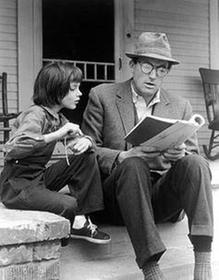 The carefully orchestrated campaign for the release tomorrow of Go Set a Watchman by Harper Lee has been thrown into some disarray by a usual suspect: the New York Times first broke the book's embargo with a front-page review on Friday by Michiko Kakutani with the headline: "Kind Hero of Mockingbird Is Cast as Racist in New Book." (Online, the headline was later toned down to the infelicitous "Harper Lee's Go Set a Watchman Gives Atticus Finch a Dark Side.")
The carefully orchestrated campaign for the release tomorrow of Go Set a Watchman by Harper Lee has been thrown into some disarray by a usual suspect: the New York Times first broke the book's embargo with a front-page review on Friday by Michiko Kakutani with the headline: "Kind Hero of Mockingbird Is Cast as Racist in New Book." (Online, the headline was later toned down to the infelicitous "Harper Lee's Go Set a Watchman Gives Atticus Finch a Dark Side.")
The Times described Go Set a Watchman, set in the mid-1950s, two decades after To Kill a Mockingbird and featuring many of the same characters, as "a lumpy tale about a young's woman's grief over her discovery of her father's bigoted views." Atticus Finch, the wise, calm, principled, inspiring hero of To Kill a Mockingbird, is now a 72-year-old racist grump who flirts with the Ku Klux Klan, says nasty things about blacks and fulminates against Brown v. Board of Education, the landmark 1954 Supreme Court decision that ended segregation in public schools. In a typical passage, according to the review, Finch says to his daughter, Jean Louise--the adult name of Scout, the seven-year-old narrator of To Kill a Mockingbird--who's visiting from New York City, "Do you want Negroes by the carload in our schools and churches and theaters? Do you want them in our world?" and "The Negroes down here are still in their childhood as a people."
More pre-embargo reviews followed, none of which were as harsh as the Times's. The Washington Post cited "a less noble Atticus Finch." The Guardian called Go Set a Watchman "more complex than To Kill a Mockingbird, but less compelling," adding that it is, "in most respects, a new work, and a pleasure, revelation and genuine literary event, akin to the discovery of extra sections from T.S. Eliot's 'The Waste Land' or a missing act from Hamlet hinting that the prince may have killed his father."
The Wall Street Journal, sister company to the book's publisher, HarperCollins, wrote: "Go Set a Watchman is a distressing book, one that delivers a startling rebuttal to the shining idealism of To Kill a Mockingbird. This story is of the toppling of idols; its major theme is disillusion.... for the millions who hold [To Kill a Mockingbird] dear, Go Set a Watchman will be a test of their tolerance and capacity for forgiveness. At the peak of her outrage, Jean Louise tells her father, 'You've cheated me in a way that's inexpressible.' I don't doubt that many who read this novel are going to feel the same way."
Reaction has ranged from shock and disappointment to caution and reserved judgment to undiminished enthusiasm about getting to read another work by the author of To Kill a Mockingbird--whatever its quality--and a curiosity about comparing the two works and understanding how one led to the other.
On social media, some people said they have cancelled orders and don't intend to read the book. "I don't need my heart broken," said one disappointed fan. On Twitter, Curtis Sittenfield wrote, "I wish I didn't feel this way, but the publication of the new Harper Lee book reminds me of a wedding everyone knows should be called off."
But for others, the book still has great appeal despite--or because of--the book's twists. On Twitter, Chelsea Gunter wrote: "Atticus Finch is the bad guy? I can't fathom the idea. Can't wait to get my hands on the book!"
 |
|
| Harper Lee, seen here in 1963, wrote Go Set a Watchman in the mid-1950s. | |
The Times itself seemed to try to shift back from the harshness of its Friday review, running a story yesterday with the headline "While Some Are Shocked by Go Set a Watchman, Others Find Nuance in a Bigoted Atticus Finch." It wrote, in part: "After the initial shock, some writers and literary critics see added value in a more complex, and flawed, version of Atticus. If Mockingbird sugarcoats racial divisions by depicting a white man as the model for justice in an unjust world, then Watchman may be like bitter medicine that more accurately reflects the times."
And Charles J. Shields, author of Mockingbird: A Portrait of Harper Lee, told the newspaper that the book's publication was well-timed, saying, "We could turn this into a plus in our national conversation about racism and the Confederate flag. It turns out that Atticus is no saint, as none of us are, but a man with prejudices."
The reviews have led to renewed interest in the book's publication. As has been reported many times, when Lee submitted the manuscript of Go Set a Watchman, her editor, Tay Hohoff, suggested she rewrite the tale from Scout's point of view as a child. That rewrite became the iconic To Kill a Mockingbird. The original MS went unpublished, and it was only after Harper Lee's sister, Alice Lee--her literary guardian--died last year, that Go Set a Watchman's "discovery" and publication was announced. Harper Lee is 89 and in a nursing home--and many aren't convinced that she is capable of judging whether the book should be published or not.
The publisher has consistently presented that title as a kind of newly discovered, stand-alone gem, "a compelling and ultimately moving narrative about a father and a daughter's relationship, and the life of a small Alabama town living through the racial tensions of the 1950s," as Jonathan Burnham, Harper's senior v-p and publisher, put it earlier this year. In fact, it seems to be more of a fledgling work that is of interest only because of its relation to a much better, mature work.
In the end, Go Set a Watchman may have best been left in the Harper Lee archives and used by scholars and others to understand the author's development as a writer and the development of the story and characters in the one book that was publishable. Still, the book is out, and is an event that at least calls more attention to its deserving sibling.

